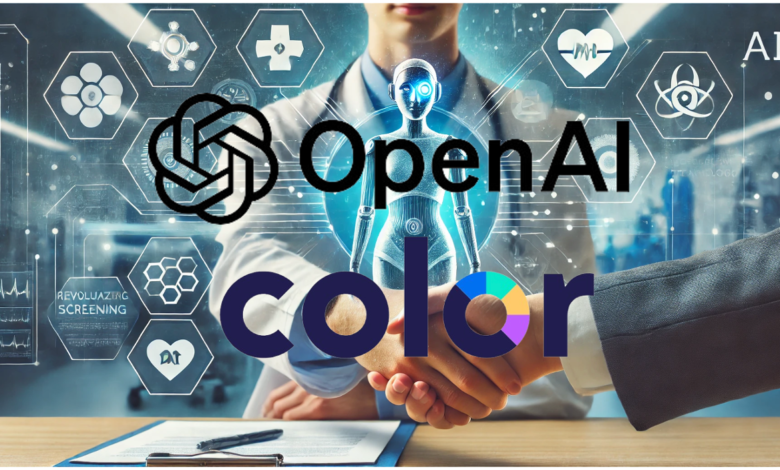
Color Health and OpenAI recently joined forces to revolutionize cancer screening and treatment through the development of an innovative AI-powered copilot. This groundbreaking partnership aims to bring the expertise of highly trained oncologists to support doctors, nurses, and primary care physicians in making evidence-based decisions about cancer screening and treatment for their patients.
The Color Health Copilot: Bridging the Gap in Cancer Care
Color Health’s copilot, powered by OpenAI’s GPT-4o model, addresses two critical areas in improving cancer outcomes:
1. Catching cancers earlier
2. Effectively managing patients into treatment
Early detection of cancer significantly improves survival rates, with most early-stage cancers having a survival rate exceeding 90%[2]. However, despite the existence of risk-adjusted guidelines, many individuals at elevated risk do not receive appropriate screening recommendations. The Color Health copilot aims to bridge this gap by providing personalized screening plans based on individual risk factors.
How the Copilot Works
The Color Health copilot leverages patient data, including family history and individual risk factors, along with evidence-based healthcare guidelines to generate personalized screening plans[4]. It can:
1. Identify missing diagnostics
2. Create tailored workup plans for patients
3. Generate necessary documentation for diagnostic workups, including insurance pre-authorizations
One of the key advantages of the copilot is its ability to extract relevant information from large volumes of inconsistently structured data[4]. This capability allows it to surface early warning signs, seemingly incongruous red flags, and other pertinent details that may be deeply dispersed throughout electronic health records and other patient information[3].
Improving Efficiency and Access to Expertise
The implementation of the Color Health copilot has shown promising results in improving the efficiency of cancer care:
1. Providers using the copilot can analyze patient records in approximately five minutes[3].
2. The tool helps identify four times as many missing labs, imaging, or biopsy and pathology results compared to providers working without the copilot[4].
By offering primary care doctors and other clinicians an AI service that can determine necessary tests for a patient’s cancer treatment, the copilot aims to reduce wait times and expedite the initiation of treatment]. This approach allows patients to be better prepared when they meet with an oncologist for the first time, potentially saving weeks of precious time in the treatment process[3].
Human-in-the-Loop Model and Quality Assurance
Importantly, HCPs are a key part of the overall process. Color Health emphasizes the centrality of maintaining a human-in-the-loop model in the implementation of their AI-powered copilot. This approach ensures that clinicians remain at the center of decision-making, with the AI tool serving as a support system rather than a replacement for human expertise[2].
The company is taking a measured approach to rolling out the copilot, using a staged model standard in patient care settings]. This process involves:
1. Initial phase-in with Color Medical physicians
2. Application of the tool to a limited number of cases from their cancer management program
3. Multiple layers of quality assurance to ensure performance equal to or better than traditional methods
Partnership with UCSF for Evaluation and Validation
To further validate the effectiveness of the copilot, Color Health has partnered with the University of California San Francisco (UCSF) Helen Diller Family Comprehensive Cancer Center. This collaboration involves:
1. Testing the copilot for cancer pretreatment diagnostic work-ups
2. Comparing the tool’s performance to retrospective analyses of cancer patient charts
3. Evaluating the potential for integrating the copilot into clinical workflows for all new cancer cases at UCSF
While the study is still in its early stages, the potential for AI to reduce wait times for cancer treatment by connecting the dots in patient information could significantly improve patient care outcomes[3].
Addressing the Oncology Expertise Gap
One of the primary goals of the Color Health copilot is to address the supply gap in oncology expertise. By providing primary care doctors and other clinicians with AI-assisted decision support, the tool aims to:
1. Determine necessary tests for informing a patient’s cancer treatment
2. Initiate the prior authorization process for pretreatment diagnostics
3. Reduce the time patients spend waiting to see an oncologist before diagnostic work begins
This approach has the potential to streamline the cancer care process, ensuring that patients are better prepared to begin treatment when they first meet with an oncologist[3].
Expanding Access to Cancer Expertise
Ultimately, Color Health’s vision is to make cancer expertise accessible at the point and time when it can have the greatest impact on a patient’s healthcare decisions. This leading-edge copilot represents a significant step towards achieving this goal by:
1. Providing personalized screening plans based on individual risk factors
2. Offering support for primary care physicians in managing cancer patients
3. Improving the efficiency of cancer care delivery
Privacy and Security Considerations
As with any healthcare application involving sensitive patient data, privacy and security are paramount. Color Health emphasizes that their copilot is designed to be HIPAA compliant and integrates patient data with evidence-based healthcare guidelines through secure APIs[4].
Future Projections and Impact
Color Health has ambitious plans for the implementation and expansion of their copilot:
1. By the end of 2024, the company anticipates that the copilot will have supported over 200,000 patient cases in generating AI personalized care plans, with physician oversight[2].
2. The tool is expected to continue improving and becoming more efficient over time, thanks to the human-in-the-loop model and ongoing refinement based on clinician feedback[4].
Implications for the Healthcare Industry
The partnership between Color Health and OpenAI, and the resulting cancer copilot, represents a significant development in the application of AI to healthcare. This collaboration has the potential to:
1. Improve early detection rates for various types of cancer
2. Reduce wait times for cancer treatment
3. Enhance the ability of primary care physicians to manage cancer patients
4. Streamline the process of generating personalized care plans
As AI continues to evolve and integrate into healthcare systems, tools like the Color Health copilot may become increasingly common, potentially transforming the landscape of cancer care and other areas of medicine.
Challenges and Considerations
While the potential benefits of the Color Health copilot are significant, it’s important to consider potential challenges and limitations:
1. Ensuring the accuracy and reliability of AI-generated recommendations
2. Maintaining the balance between AI assistance and human expertise
3. Addressing potential biases in the AI model and training data
4. Navigating regulatory and ethical considerations surrounding AI in healthcare
Conclusion
The partnership between Color Health and OpenAI represents a promising step forward in the application of AI to cancer care. By leveraging advanced language models and machine learning techniques, the Color Health copilot has the potential to significantly improve cancer screening, diagnosis, and treatment processes.
As this technology continues to evolve and be refined through real-world application and rigorous evaluation, it may play an increasingly important role in bridging the gap between primary care and specialized oncology expertise. The ultimate goal is to improve patient outcomes by enabling earlier detection, faster treatment initiation, and more personalized care plans.
While challenges remain, the collaborative approach taken by Color Health, OpenAI, and research partners like UCSF demonstrates a commitment to responsible innovation in healthcare. As we move forward, it will be crucial to continue monitoring the performance and impact of such AI-powered tools, ensuring that they truly enhance patient care while maintaining the critical role of human expertise in medical decision-making.
Citations:
[1] https://openai.com/index/color-health/ [2] https://www.color.com/blog/colors-copilot-and-partnership-with-openai [3] https://www.healthcareitnews.com/news/color-health-uses-openai-develop-cancer-screening-copilot-doctors [4] https://www.fiercehealthcare.com/health-tech/color-health-openai-work-together-ai-generated-screening-plans-cancer-patients [5] https://www.wsj.com/articles/openai-expands-healthcare-push-with-color-healths-cancer-copilot-86594ff1



